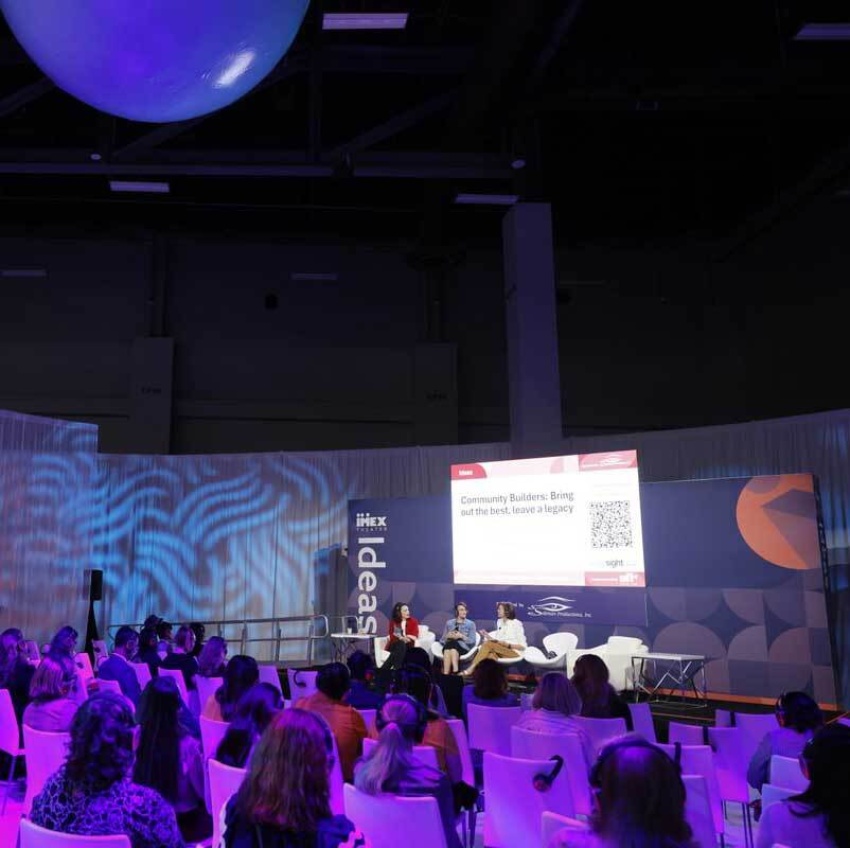At IMEX America 2025, our trends and research track revealed how the global events industry is evolving—and what planners can do to stay ahead. From generational shifts to AI adoption, the sessions offered practical insights for designing purpose-driven, inclusive and high-impact experiences.
Here are five key takeaways:
- Generational shift in attendee motivation
Ken Holsinger, Freeman described the transition from Boomers and Gen X to Millennials and Gen Z as a tectonic shift. Younger attendees prioritize career growth, authentic connection and well-being over wow-factor moments. - Planners and attendees define success differently
Data from Freeman showed that 80% of planners believe attendees experience a peak or memorable moment. Attendees value learning and networking more than galas or celebrity speakers. - ESG is now essential
ESG is no longer optional. Corporates are evaluating ESG scores and destinations based on social impact and sustainability. - Optimism persists despite macro pressures
Demand for face-to-face meetings remains strong, even amid rising costs and geopolitical uncertainty. But planners must navigate visa delays, budget constraints and shifting travel patterns. - DMOs are strategic co-creators
Destinations International’s research shows that destination management organizations are evolving from sales arms to partners in community development, crisis management and reputation stewardship.
The challenges ahead:
- Talent gaps and burnout
There’s a dual crisis of hiring delays and widespread burnout. Without better planning and well-being support, the industry risks losing its people. - Reputation management is more complex
The Destination Reputation study from Destination International found that four out of five planners have reconsidered a destination due to safety or political concerns. Transparent, real-time data is now essential. - Measurement gaps limit strategic value
28% of event leaders don’t have KPIs. Without clear metrics, events risk being seen as cost centers rather than strategic investments. - Innovation is lagging
Joelle Morgan from AssetMark noted that most teams trial only one to five new formats a year. A rinse-and-repeat mindset won’t meet changing attendee expectations. - AI adoption is too shallow
65% of event leaders use AI only for copywriting. This misses the opportunity to use AI for strategic tasks like data analysis, personalization and logistics.
The opportunities to seize:
- Design around attendee goals
Use the Excellence framework—Experience, Learning, Networking, Commerce—to personalize journeys and boost retention. - Architect serendipity
Freeman’s research showed that one meaningful connection boosts first-time attendee retention from 30% to 51%. Consider creating a Chief Networking Officer role to design purposeful connection spaces. - Use AI as a strategic assistant
Heather Schneider, Celonis demonstrated how tools like Notebook LM can help planners analyze data, benchmark performance and identify gaps, freeing up time for creativity. - Build deep destination partnerships
Engage destination management companies early to co-create legacy projects and authentic experiences that tap into local culture and their expertise. - Implement reverse mentorship
Structured programs, where junior team members mentor senior leaders on tech and trends, foster adaptability and inclusivity across organizations.
From shifting generational values to the strategic use of AI and ESG, planners are being called to rethink how events are designed, measured and delivered. By embracing innovation, listening to attendees and building deeper partnerships, we can create experiences that are not only impactful but truly meaningful. The future of events is purposeful, data-driven and human-centered—and it’s already here.
Back to the track. We’ll be back on trends and research track at IMEX Frankfurt 2026. Stay tuned.
Report created with the help of Snapsight and SparkAI.





